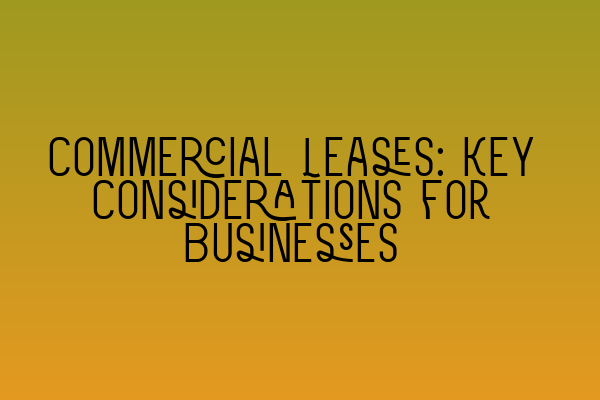Commercial Leases: Key Considerations for Businesses
As a business owner, finding the right location for your company is a critical decision. One of the options you might consider is entering into a commercial lease. A commercial lease is a legal agreement between a landlord and a business tenant, outlining the terms and conditions for renting a commercial property. It is important to fully understand the key considerations involved in entering into a commercial lease to protect your business’s interests. In this article, we will discuss the essential factors that should be taken into account when entering into a commercial lease.
1. Lease Terms and Rent
The lease terms are the specific details that define the rights and obligations of both the landlord and the tenant. It is essential to carefully review and negotiate lease terms to ensure they align with your business needs. Consider the length of the lease, rent amount, rent escalation provisions, and renewal options. Understanding these terms will help prevent any surprises or hidden costs down the line.
2. Use and Occupancy
Clearly define the permitted use of the commercial space in the lease agreement. Ensure that the property is zoned for your intended use and that you comply with any regulatory restrictions or requirements. Consider both present and future needs, making sure the property can accommodate any planned expansion or changes in your business operations.
SQE 1 Practice Mocks FLK1 FLK2
3. Maintenance and Repairs
Understanding the responsibilities for maintenance and repairs is crucial. Determine who is responsible for the upkeep of the property, including repairs and any necessary renovations. Clarify the process for reporting maintenance issues and the timeframes for resolution. Be sure to inspect the property thoroughly, noting any existing damage before signing the lease.
4. Lease Assignment and Subletting
Consider whether you will have the option to assign or sublet the leased space in the future. This flexibility can be advantageous if your business needs change or if you wish to share the cost of rent with another company. Understand the landlord’s approval process and any associated fees or restrictions.
5. Termination and Break Clause
Review the termination and break clause provisions in the lease. These clauses outline the circumstances under which you may end the lease early or negotiate changes to the agreement. Having the ability to terminate the lease or negotiate new terms can provide flexibility and protect your business from unforeseen circumstances.
6. Rent Review
Commercial leases often include provisions for rent reviews, allowing the landlord to increase the rent periodically. Understand how the rent review process works, the frequency of reviews, and the bases for determining rent increases. This knowledge will help you anticipate future financial obligations and plan your budget accordingly.
7. Alterations and Improvements
If you plan to make alterations or improvements to the leased space, clarify the requirements with the landlord. Determine who will bear the cost and responsibility for obtaining necessary permits. Ensure you have the right to remove any improvements made at the end of the lease term.
8. Legal Advice
Seeking legal advice before entering into a commercial lease is highly recommended. A solicitor specializing in property law can review the lease, identify potential risks, and negotiate favorable terms on your behalf. They can ensure that your interests are protected and prevent any legal complications in the future.
In conclusion, when considering a commercial lease, it is crucial to thoroughly review and understand the lease’s terms and conditions. Key considerations include the lease terms and rent, permitted use, maintenance and repairs, lease assignment and subletting, termination and break clauses, rent review, alterations and improvements, and seeking legal advice. By taking these factors into account, you can make informed decisions that align with your business’s goals and protect your interests.
Remember to consult SQE 1 Preparation Courses and SQE 2 Preparation Courses for expert guidance in your journey towards becoming a qualified solicitor.
